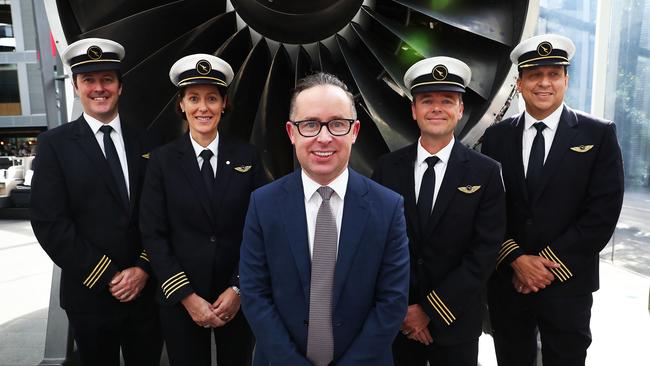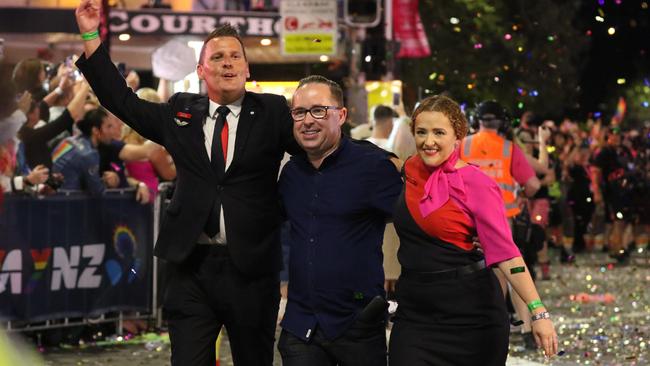Investors losers in corporate political correctness
At the risk of not getting an upgrade, the prize for the most ridiculous corporate communication this week must go to Qantas.

At the risk of not getting an upgrade, the prize for the most ridiculous corporate communication this week must go to Qantas. It’s no mean feat in a week chock full of relentless diversity promotion, powered by no less than the Sydney Gay and Lesbian Mardi Gras and International Women’s Day at either end.
Even my online wine supplier has bundled together a few cab savs from South Australia and called it an “International Women’s Day Pack”: “By buying this pack you’re not only getting six benchmark Aussie reds, you’re helping us promote gender equality in the Aussie wine industry”. Really?
Anyway, it’s tough competition but Qantas’s Spirit of Inclusion memo to staff, complete with online video, is a superlative example of an increasingly torrential class of corporate communication that perhaps best reflects what philosophy professor Harry Frankfurt meant when he wrote On Bullshit in 2005. The memo encourages staff to call out “non-inclusive language, especially when coming from powerful or influential people”. Using terms husband and wife and mum and dad reinforces “the idea people are always in heterosexual relationships” — use partner or parent instead. Arthur Phillip didn’t “settle” NSW, he “invaded” or “colonised” it. And don’t assume lesbians like sport or Aborigines live in the outback, either.
“Research shows that in many situations, men interrupt and speak over women, while the reverse rarely happens,” the memo adds, teasing staff by leaving out the source of said research.
There’s a specific “what not to say” section too, cautioning against using “Which bathroom do you use?”, “I always suspected you were gay” and “What do you do in bed?” This part does seem to grate with the memo’s overarching aim, though, which Qantas’s head of people and culture says is to foster an “environment where everyone feels comfortable to bring their whole selves to work”. Let a thousand employees bloom.
If Qantas staff fall short of these lofty standards, using “love” or “darling” as terms of endearment, for instance, thwarting corporate efforts to build inclusion, the memo offers a few personal communication strategies, such as “I’m sorry it wasn’t my intention to offend you”. Perhaps we urgently need to spend more on primary school after all.

You get the point. The more serious one, though, is how large firms are able to lavish so much on irrelevant things far removed from their business purpose.
As Frankfurt suggested, no one deep down takes corporate bullsh.. seriously, but it nevertheless sustains a growing army of highly paid diversity and thought leadership roles.
Economist Ronald Coase, in 1937, explained that companies existed because the free market system was expensive to run.
Naturally occurring “transaction costs”, such as working out the correct price and the time and communication costs involved in agreeing a price, made firms an inevitable feature of modern economies. A bit of command and control made sense.
For instance, it would be costly and time consuming for workers and firms to negotiate their pay every day, according to market conditions.
In reality, firms’ revenues and costs are carved up by management fiat, not free market forces.
“A point must be reached where the costs of organising an extra transaction within the firm are equal to the costs involved in carrying out the transaction in the open market, or to the costs of organising by another entrepreneur,” Coase wrote.
“A point must be reached where the loss through the waste of resources is equal to the marketing costs of the exchange transaction in the open market,” he wrote in his Theory of the Firm, a landmark work in what economists call “industrial organisation”.
In other words, there can be “diseconomies of scale, just as there are economies”. So-called “compensation” of management increases as the size of the company increases, for instance. Management becomes more powerful in relation to shareholders.
Qantas’s memo is yet another example that suggests modern firms may have grown past their point of optimal size.
Big companies are wasting money on feel-good diversity campaigns precisely because they have so much scope for waste, not because its inherently economic or productivity.
The idea the local Vietnamese restaurant would hire a head of diversity or a thought leader is ridiculous. They are too busy cooking and washing up.
Firms have never been so large in Australia, or in other advanced economies, and more of the economy is operating less along the lines of a true free market.
The internal workings of large firms are just like government bureaucracies, yet they receive far less scrutiny than the public sector. The Commonwealth Bank and the department of health have far more in common than it seems.
Perhaps we should be as exercised about waste in big companies when compulsory superannuation ensures nearly 10 per cent of our wages flow into them by law.
The shareholders of Qantas don’t want waste at our biggest airline any more than taxpayers want waste in government.
Declaring things free market or not, or public and private, is a lot trickier than it first seems, as Coase made clear 80 years ago.






To join the conversation, please log in. Don't have an account? Register
Join the conversation, you are commenting as Logout